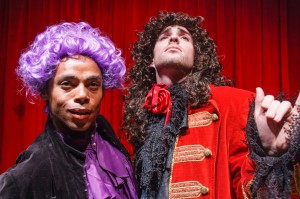TITTY GARAGE
Shows that are listed at two hours and fifteen minutes shouldn’t be forgiven for running three hours, unless they are written by a genius like Mikhail Bulgakov. One of that early Soviet dissident’s plays is in fact embedded in Charles A. Duncombe’s new play, sort of, but it’s a dream version that takes place simultaneously in an underwritten 17th Century France and an overfamiliar 21st 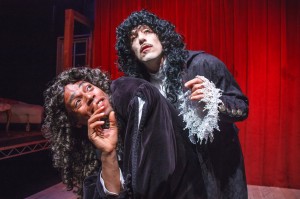 Century America. It is bookended by a scenario of Duncombe’s invention, half travelogue and half literary in-joke. Along with his City Garage co-founder and director Frédérique Michel, he has done so much work on this project that it’s impossible to dismiss. But despite its labor-intensive historical re-contextualization and some excellent acting, it’s also impossible to call it a good show. I think there’s a show in there. Ground in half, sharpened like a razor, its writer’s and director’s darlings killed, it could cut like a rapier. Right now, it’s pommel-heavy and too clumsy to thrust or parry. (No, there’s no swordfight, but there should be. In fact, a swordfight’s one of the things Duncombe cut out to make room for his own dialogue.)
Century America. It is bookended by a scenario of Duncombe’s invention, half travelogue and half literary in-joke. Along with his City Garage co-founder and director Frédérique Michel, he has done so much work on this project that it’s impossible to dismiss. But despite its labor-intensive historical re-contextualization and some excellent acting, it’s also impossible to call it a good show. I think there’s a show in there. Ground in half, sharpened like a razor, its writer’s and director’s darlings killed, it could cut like a rapier. Right now, it’s pommel-heavy and too clumsy to thrust or parry. (No, there’s no swordfight, but there should be. In fact, a swordfight’s one of the things Duncombe cut out to make room for his own dialogue.)
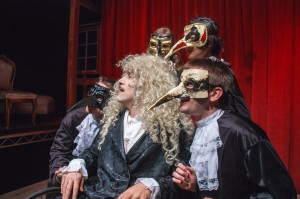 Bulgakov, after twenty minutes’ drunken rant to his mistress about how Stalin used to like his work but now won’t let him publish what he wants, dreams that his Moscow apartment is invaded by characters from his novel, The Master and Margarita, the manuscript for which he’s just thrown on the fire. These fictional sprites grant Bulgakov’s wish and whisk him to America, where another of the novel’s characters – the devil, AKA Professor Woland – is directing them, and Bulgakov’s mistress, and some other people because why not, as actors in Bulgakov’s outlawed 1936 play, The Cabal of Hypocrites, about dramatist Jean-Baptiste Molière’s own issues with censorship and his fall from grace with Louis XIV. Fairly on the nose, but so far, on paper at least, so good. Bulgakov climbs into a box seat to watch his play.
Bulgakov, after twenty minutes’ drunken rant to his mistress about how Stalin used to like his work but now won’t let him publish what he wants, dreams that his Moscow apartment is invaded by characters from his novel, The Master and Margarita, the manuscript for which he’s just thrown on the fire. These fictional sprites grant Bulgakov’s wish and whisk him to America, where another of the novel’s characters – the devil, AKA Professor Woland – is directing them, and Bulgakov’s mistress, and some other people because why not, as actors in Bulgakov’s outlawed 1936 play, The Cabal of Hypocrites, about dramatist Jean-Baptiste Molière’s own issues with censorship and his fall from grace with Louis XIV. Fairly on the nose, but so far, on paper at least, so good. Bulgakov climbs into a box seat to watch his play.
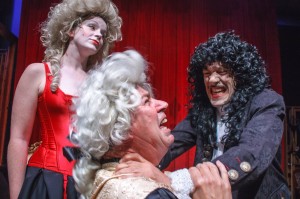 But it’s not really his play we watch; firstly, for Moliere’s villainous Archbishop, Duncombe substitutes a slick, modern televangelist played by (lest we miss the joke) the devil. Bulgakov’s melodrama of Molière’s persecution and fall from popular darling to public enemy, involving fey royals, repentant turncoats, and wives who might be daughters, is interesting and compelling though far from the Russian’s best work. In rewriting a genius – always risky – Duncombe retains Bulgakov’s period and setting while imposing his own modern political gripes, so that wigged and powdered fops interact with sleek business suits on a Regency stage. That cheeky stuff can be fun, but it keeps getting interrupted by winks from Bulgakov characters playing other Bulgakov characters, who repeatedly stop the action to grin up at him up in his box seat, asking him how he, and by extent the audience, likes the production. This is really tempting fate, especially after Duncombe introduces an unfunny, unnecessary, unending subplot satirizing modern trends in theatrical political correctness: Molière must take sexual harassment classes, attend grant-writing seminars, hire focus groups’¦his actors have managers who lip-sync entire songs into iPhones and encourage their clients to strike for better working conditions’¦since he doesn’t have a development process per se, Molière is asked how he could possibly know what his public likes. He answers that when they like a show, they applaud; when they don’t, they throw things.
But it’s not really his play we watch; firstly, for Moliere’s villainous Archbishop, Duncombe substitutes a slick, modern televangelist played by (lest we miss the joke) the devil. Bulgakov’s melodrama of Molière’s persecution and fall from popular darling to public enemy, involving fey royals, repentant turncoats, and wives who might be daughters, is interesting and compelling though far from the Russian’s best work. In rewriting a genius – always risky – Duncombe retains Bulgakov’s period and setting while imposing his own modern political gripes, so that wigged and powdered fops interact with sleek business suits on a Regency stage. That cheeky stuff can be fun, but it keeps getting interrupted by winks from Bulgakov characters playing other Bulgakov characters, who repeatedly stop the action to grin up at him up in his box seat, asking him how he, and by extent the audience, likes the production. This is really tempting fate, especially after Duncombe introduces an unfunny, unnecessary, unending subplot satirizing modern trends in theatrical political correctness: Molière must take sexual harassment classes, attend grant-writing seminars, hire focus groups’¦his actors have managers who lip-sync entire songs into iPhones and encourage their clients to strike for better working conditions’¦since he doesn’t have a development process per se, Molière is asked how he could possibly know what his public likes. He answers that when they like a show, they applaud; when they don’t, they throw things.
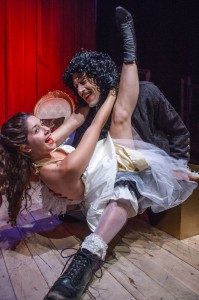 I didn’t throw anything. I would have, really, if the house had been packed. But when the cast outnumbers the audience by as many as it did Friday night, and the production takes itself as deadly seriously as this one does, well, I’m not that big an asshole. A play this outrageous in its conceit absolutely should welcome such anarchy, but I suspect this production only pretends to have a sense of humor.
I didn’t throw anything. I would have, really, if the house had been packed. But when the cast outnumbers the audience by as many as it did Friday night, and the production takes itself as deadly seriously as this one does, well, I’m not that big an asshole. A play this outrageous in its conceit absolutely should welcome such anarchy, but I suspect this production only pretends to have a sense of humor.
Rather than helping Duncombe out of the holes into which he’s written himself, Michel’s direction ignores the script entirely. The playwright has designed his own set (very prettily and smartly, although it can feel as crammed-full as his script), and his director apparently thinks that’s plenty of assistance for one piece of writing. Instead of dealing with the play, or with her actors, she seems exclusively interested in a number of vaguely sexual fetishes, such as the taking off and putting on of boots and stiletto heels, the clear outlining of male genitalia gone commando under tights, the balletic nude en pointe. I’m not one to tell a girl to put her clothes on. But when the director’s subconscious is even more baldly exposed than her naked actors, the whole thing’s a bore.
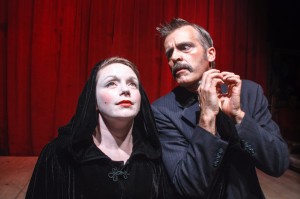 What Duncombe has to say about Nice Guyist theatrical politics such as nontraditional casting is unclear – maybe that it’s its own kind of censorship, but such an obvious point hardly bears repeating for hours. He wraps up his play, once Bulgakov wakes from his dream, with clichés about genius staying true to itself while reigning in its own excesses. He reminds us that any hardship can be faced if one has true love – I do not kid – and oh, remember the manuscript to the novel that the author threw on the fire? Well, there’s a line from that very novel about how manuscripts don’t burn. Right? You read the book, right? So it’s funny?
What Duncombe has to say about Nice Guyist theatrical politics such as nontraditional casting is unclear – maybe that it’s its own kind of censorship, but such an obvious point hardly bears repeating for hours. He wraps up his play, once Bulgakov wakes from his dream, with clichés about genius staying true to itself while reigning in its own excesses. He reminds us that any hardship can be faced if one has true love – I do not kid – and oh, remember the manuscript to the novel that the author threw on the fire? Well, there’s a line from that very novel about how manuscripts don’t burn. Right? You read the book, right? So it’s funny?
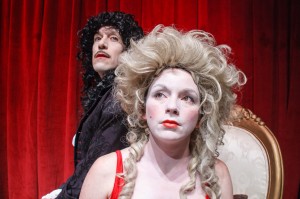 That stuff should all go – indeed, sometimes I thought the author had dumped his every related thought and bit of research onto the stage. But there are delightful scenes too, mostly undamaged bits of Bulgakov, and the biggest bummer is that this show contains some really fine acting. It’s never a waste for George Villas to be onstage; the show may not work, but he certainly does. His Molière inhabits a time, a place, a reality, quite other and quite credible. He is funny, pathetic, altogether moving. His scenes with the comically gifted Alex Pike, as the deliciously spoiled Sun King, are so hilarious and well-timed that I was tempted to think I was watching a play. Similarly unsinkable, RJ Jones brings to vivid life a number of outré characters – a right-wing radio host, a fawning card cheat, a demonic assassin – each delineated and fascinating. Jeremy Lelliott, with nothing to do, still does a lot of good.
That stuff should all go – indeed, sometimes I thought the author had dumped his every related thought and bit of research onto the stage. But there are delightful scenes too, mostly undamaged bits of Bulgakov, and the biggest bummer is that this show contains some really fine acting. It’s never a waste for George Villas to be onstage; the show may not work, but he certainly does. His Molière inhabits a time, a place, a reality, quite other and quite credible. He is funny, pathetic, altogether moving. His scenes with the comically gifted Alex Pike, as the deliciously spoiled Sun King, are so hilarious and well-timed that I was tempted to think I was watching a play. Similarly unsinkable, RJ Jones brings to vivid life a number of outré characters – a right-wing radio host, a fawning card cheat, a demonic assassin – each delineated and fascinating. Jeremy Lelliott, with nothing to do, still does a lot of good.
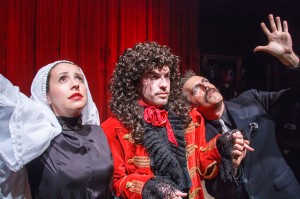 The rest of the 14-member cast founders to varying degrees, drowning in different plays with no cohesive direction. It is an ugly and painful experience to cringe as two nude actresses, with no opportunity to reveal any acting talent, play bad nude actresses complaining that they want to be taken seriously as artists. This is the kind of willful, self-indulgent show that puts an audience in the position of feeling sorry for everyone who got cast. In a week when the Los Angeles theater community has gone up in arms over one dismissive article in a national magazine, I’d like every outraged Angelino to come see Bulgakov/Molière at this highly lauded, twenty-five year old institution: the talent mishandled, the cleverness diluted by self-indulgence. The I-have-a-municipal-grant, I-live-in-a-vacuum, all-in, fuck-you mediocrity behind the creative team’s attitude. And I’d like everyone to remember that I predict awards for this production by this time next year. It is no worse than some shows that cleaned up in our local sweepstakes this time around, and it is bad in many of the same ways, so it’s got a good shot.
The rest of the 14-member cast founders to varying degrees, drowning in different plays with no cohesive direction. It is an ugly and painful experience to cringe as two nude actresses, with no opportunity to reveal any acting talent, play bad nude actresses complaining that they want to be taken seriously as artists. This is the kind of willful, self-indulgent show that puts an audience in the position of feeling sorry for everyone who got cast. In a week when the Los Angeles theater community has gone up in arms over one dismissive article in a national magazine, I’d like every outraged Angelino to come see Bulgakov/Molière at this highly lauded, twenty-five year old institution: the talent mishandled, the cleverness diluted by self-indulgence. The I-have-a-municipal-grant, I-live-in-a-vacuum, all-in, fuck-you mediocrity behind the creative team’s attitude. And I’d like everyone to remember that I predict awards for this production by this time next year. It is no worse than some shows that cleaned up in our local sweepstakes this time around, and it is bad in many of the same ways, so it’s got a good shot.
Bulgakov’s embattled artistic career certainly inspired his most celebrated works. But really, does theater need more theater about theater right now? Does not art about art, after a while, suggest a paucity of inspiration, a lack of curiosity, a myopia blinking on the edge of irrelevance? Remember too that when Bulgakov and Molière created their best political art, they did it allegorically, and competently.
photos by Paul M. Rubenstein
Bulgakov/Molière
City Garage Theatre
Bergamot Station, building T1
2525 Michigan Ave. in Santa Monica
scheduled to end on June 1, 2014
for tickets, call (310) 453-9939 or visit www.citygarage.org

